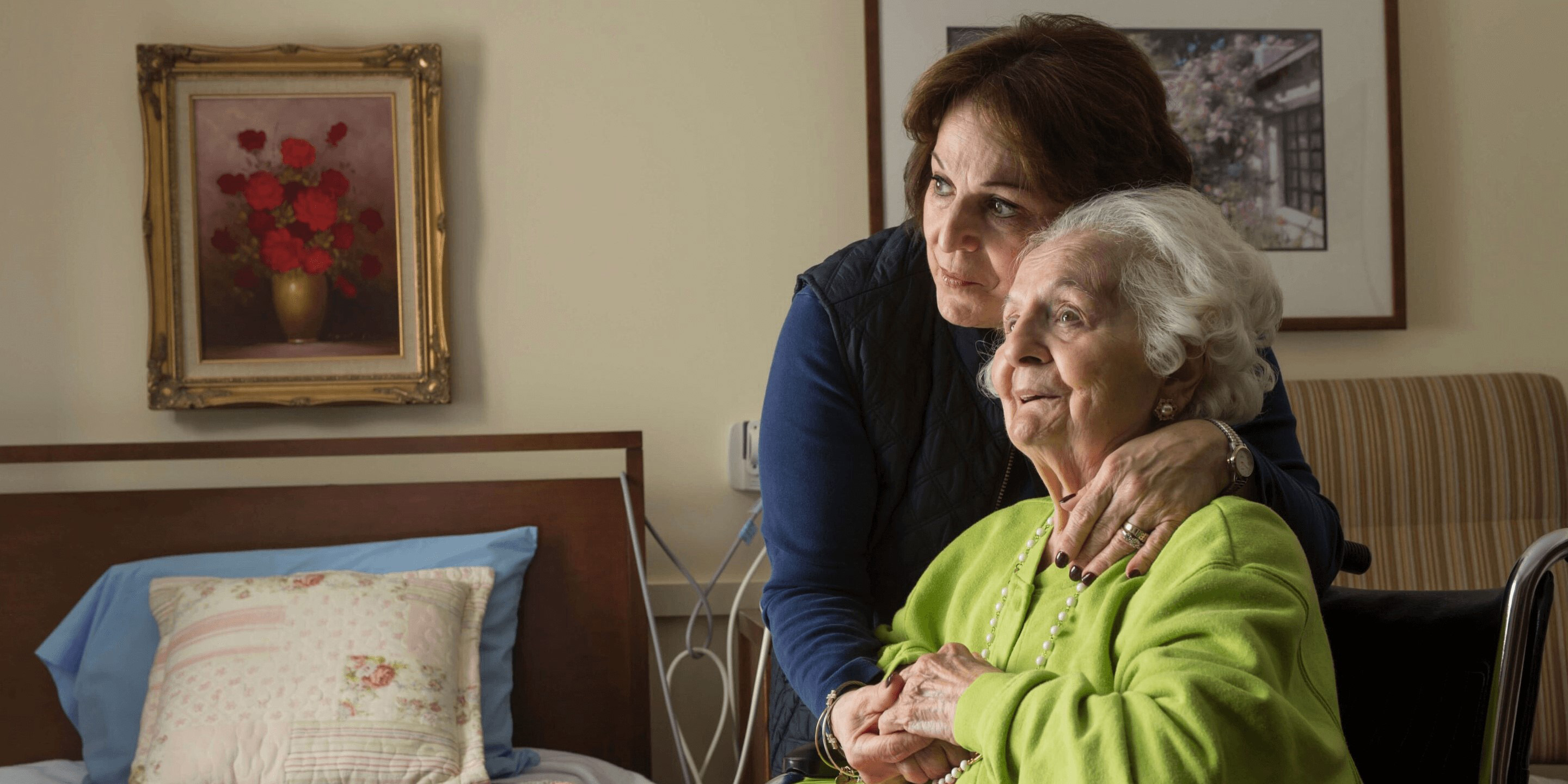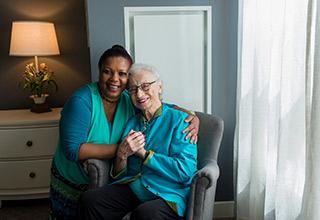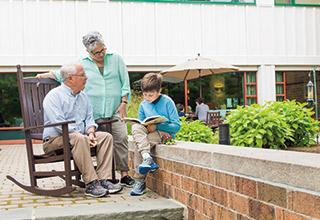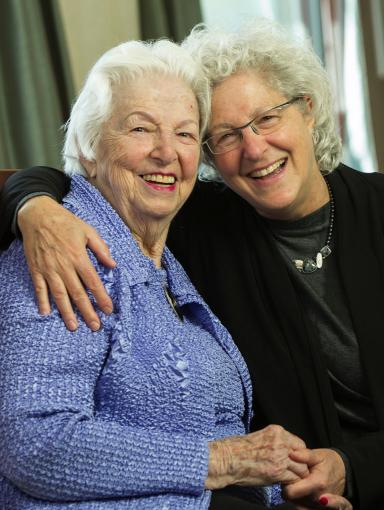Navigating Changing Parent-Child Relationship Dynamics in Older Adulthood
Learn how to communicate effectively as you adapt to the role reversal that comes with caregiving.

If you’re an older parent, you’ve likely experienced the joys and trials of witnessing your children become the adults they are today. Your relationship with them has undoubtedly changed many times throughout the course of their lives as they’ve grown up and become independent. In older adulthood, your relationship with them will probably change even more.
If you’re the adult child of a senior parent, you may be taking on a new role in your parent’s life, helping them out more often or even becoming their caregiver. This role reversal isn’t always easy to navigate and could lead to tension and strain in your relationship.
That role reversal is a shift that 86-year-old Hebrew SeniorLife resident Shirley experienced with her daughter Ruth. When Shirley’s husband was diagnosed with Alzheimer’s disease just months after her daughter relocated back to the Greater Boston area, it became clear that they needed some extra support. Shirley and her husband decided to move out of their home and into Hebrew SeniorLife’s NewBridge on the Charles in Dedham, MA.
Ruth, 57, offers her mother ongoing support with tasks like managing her calendar of medical appointments, helping with bill payments and other financial matters, and sending her texts with reminders for the day every morning.
“Our roles changed in that I was the parent and she was the child, and of course, now it’s the other way around by mutual choice because I need a lot of advice and direction and taking things off my plate. My daughter has been amazing about being totally there for me,” says Shirley.
By maintaining honest and open communication, setting the right boundaries, and learning to adapt to your evolving roles, your relationship can become a source of growth and mutual respect. It may feel challenging at times, but you can work together as a team to understand and navigate your changing dynamic. Read on to gain some insight into how.
Understanding the shift in your relationship
The main relationship shift I’ve witnessed between seniors and their adult children is the role reversal I mentioned above, which is when children take care of their parents in ways that are similar to how their parents once took care of them. When age-related changes emerge, it’s common for some of the responsibilities that once fell on the parents’ shoulders to reverse.
That type of shift can be tricky to adjust to. Some parents may feel infantilized or defensive when the child they raised approaches them about things they don’t want to discuss, like changes in their health. Adult children are overwhelmingly well-meaning, coming from a place of concern, anxiety, and wanting to see their parent live their healthiest lives — but they may not know the best way to broach certain conversations. For example, bringing up the possibility of no longer driving due to safety concerns requires a level of sensitivity that doesn’t come easily to everyone.
For Ruth, staying respectful of her parents' decision-making and autonomy was top-of-mind during these conversations. “I’ve never said ‘I’m just doing it,’ when it comes time to talk about no longer driving or moving to assisted living, or whatever we have to talk about,” she explains.
Common sources of conflict or tension
With the change in your relationship, multiple factors can lead to tension or conflict. Here are some of the common points of tension I’ve seen in my time working with seniors and their adult children:
- Memory changes. Declines in memory caused by diseases like Alzheimer’s affect how people communicate and behave over time, which can impact relationships. While this can pose challenges, a fulfilling relationship is still possible, even as the condition progresses.
- Driving issues. Children may notice what they consider to be red-flag driving behaviors that they think mean their parent shouldn’t be behind the wheel. But for older adults, losing the ability to drive represents a loss of independence and autonomy. An off-road clinical driver evaluation, which we offer at Hebrew SeniorLife, can help you determine whether it’s safe to keep driving or whether you should start considering alternatives.
- Financial matters. Children may feel disgruntled if they believe their parent is spending too much, especially if they are using some of their own money to help out or if they’re concerned about their parent running out of money. Creating a budget together, establishing financial boundaries, setting up automatic bill payments, and sitting down with a financial advisor are some things you may want to consider if financial matters are posing problems between the two of you. You may also want to consider planning early and setting up a power of attorney document that gives the adult child the legal authority to handle the parent's finances if there comes a time when they may not be able to do this independently.
- In-home care. Some older adults don’t like the thought of accepting at-home care, equating it to an insulting loss of freedom or independence. They may feel uncomfortable at the thought of a stranger watching over them in their home. It’s better to work with them to understand and acknowledge why they’re hesitant to accept in-home care rather than dismissing them as irrational or unreasonable.
- Living arrangements. As the child of an older adult, you may see your parent struggle with things that indicate that they’d be safer in a different living situation. As an older adult, moving from your home into a senior living community or from independent living into a more advanced level of care, such as assisted living, can bring up many emotions and may even feel like giving up. Working together through the decision and the emotions that come with it can help make the process easier.
Of course, these are just some examples of the types of conflicts that may emerge — each family and relationship is unique, so you may be dealing with something else entirely.
A common theme in many of these sources of conflict is concerns about losing autonomy and independence. It’s important to add that even when an adult child is caretaking for their senior parent, older adults are the decision-makers for their own lives and have the right to choose what matters to them. A child may not agree with all of their parents’ choices, but they still have the power to make them. Pushing your parent to make changes that are your priority instead of theirs can add tension, aggravation, and stress to your relationship.
“I want to make sure I’m treating my parents with dignity. I’m very cautious of wanting to be respectful of their desires and decision-making and autonomy, while also being attentive to their being safe and getting the kind of care they need,” explains Ruth.
The exception to this is if a health care proxy or a power of attorney are invoked, which are legal documents that allow someone else to act on your behalf. That makes it important to plan ahead before that time comes when it comes to putting those documents in place.
Effective communication is key to overcoming conflict
You might have a close relationship with your child or parent with open, respectful communication being a priority on both sides. On the flip side, you may have a strained or distant relationship — both are possible! No parent-child relationship is the same.
If your relationship isn’t the closest or has some tension, it can be valuable to have a neutral third party facilitate communication between the two of you. Geriatric care managers, doctors, rabbis, and other spiritual care advisors are some examples of third parties that can help lower tension and anxiety between older adults and their children. That way, the child can focus more on providing emotional support to their parent and less on being the one to initiate care suggestions.
As the child in the relationship, a great rule of thumb is to listen more than you speak. We live in a culture where the voices of older adults often go unheard, so valuing their thoughts and opinions can help facilitate a positive relationship.
As an older adult, it’s natural to feel defensive or upset when you’re hearing feedback that you’re not thrilled about, especially if it’s related to your health. Understanding that your child’s feedback comes from a place of love and concern and that they’re trying their best to communicate effectively with you can go a long way.
Honesty and vulnerability aren’t a natural part of everyone’s relationship dynamic, but are something to lean into. It will take both of you to build a strong relationship, but it is possible.
For Shirley and Ruth, remaining patient, mutually respectful, and gentle with each other has helped them maintain a close relationship and remain at ease even when navigating conversations around heavy topics. “Doing the opposite of that really gets you nowhere,” advises Shirley. “Don’t forget the big picture. These are the days you can enjoy having each other,” Ruth adds.
Explore Hebrew SeniorLife’s Support Group Resources
Hebrew SeniorLife offers in-person and virtual caregiver support groups and grief support groups led by licensed clinicians. Our support groups are a great place for adult children to share their unique experiences and learn from each other in a supportive and caring environment.
We also offer additional support groups for Hebrew SeniorLife residents and their families. At NewBridge on the Charles in Dedham, MA, we run a support group for the adult children of residents.
If you’re caring for a loved one with dementia, our Deanna and Sidney Wolk Center for Memory Health in Boston, MA offers a number of resources. Explore our family and caregiver support group options or call 617-363-8600 for more information.
Blog Topics
Learn More
Wolk Center for Memory Health
The Deanna and Sidney Wolk Center for Memory Health at Hebrew SeniorLife provides outpatient memory care services, in person and virtually, for people living with cognitive symptoms — and for their families and caregivers.

Senior Living
Hebrew SeniorLife offers a variety of senior living options, including independent living, assisted living, and enhanced living. There are options for every lifestyle and budget.





